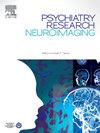Glutamate concentrations and cognitive deficits in ultra-treatment-resistant schizophrenia: An exploratory and comparative 1H-MRS study
IF 2.1
4区 医学
Q3 CLINICAL NEUROLOGY
引用次数: 0
Abstract
Background and aims
Glutamate plays a crucial role in cognition, learning, and mood regulation, with studies suggesting glutamatergic dysfunction in chronic schizophrenia. This study explored glutamate levels in the occipital cortex (OCC) and cognitive function in ultra-treatment resistant schizophrenia (uTRS) compared to healthy controls.
Methods
Fifteen uTRS participants and 19 healthy controls underwent 3T proton magnetic resonance spectroscopy (1H-MRS) to measure glutamate levels in the OCC. Cognitive performance was assessed using the MATRICS Consensus Cognitive Battery (MCCB).
Results
No significant differences in OCC glutamate levels were found between uTRS participants and healthy controls. uTRS participants performed significantly worse on the MCCB compared to healthy controls, with a large effect size (η² = 0.72). Although no significant direct relationships were observed between Glu levels and cognitive performance, significant regression models for certain cognitive domains suggest a modest association between Glu levels and cognitive outcomes.
Conclusion
Participants with uTRS exhibited significant cognitive deficits compared to healthy controls, though no significant differences in OCC Glu levels were found. While no clear linear or quadratic relationships emerged, Glu explained a small portion of the variance in cognitive performance, indicating a more complex role for Glu in cognition that warrants further investigation.
谷氨酸浓度和超治疗抵抗性精神分裂症的认知缺陷:一项探索性和比较1H-MRS研究。
背景和目的:谷氨酸在认知、学习和情绪调节中起着至关重要的作用,研究表明慢性精神分裂症中存在谷氨酸能功能障碍。本研究探讨了与健康对照相比,超治疗抵抗性精神分裂症(uTRS)患者枕皮质(OCC)中的谷氨酸水平和认知功能。方法:15名uTRS参与者和19名健康对照者采用3T质子磁共振波谱(1H-MRS)测量OCC中谷氨酸水平。认知表现评估使用矩阵共识认知电池(MCCB)。结果:uTRS参与者与健康对照组之间OCC谷氨酸水平无显著差异。与健康对照组相比,uTRS参与者在MCCB上的表现明显更差,效应量很大(η²= 0.72)。虽然没有观察到Glu水平与认知表现之间的直接关系,但某些认知领域的显著回归模型表明Glu水平与认知结果之间存在适度的关联。结论:与健康对照相比,uTRS患者表现出显著的认知缺陷,尽管OCC - Glu水平没有显著差异。虽然没有明确的线性或二次关系出现,但Glu解释了认知表现的一小部分差异,表明Glu在认知中的更复杂的作用值得进一步研究。
本文章由计算机程序翻译,如有差异,请以英文原文为准。
求助全文
约1分钟内获得全文
求助全文
来源期刊
CiteScore
3.80
自引率
0.00%
发文量
86
审稿时长
22.5 weeks
期刊介绍:
The Neuroimaging section of Psychiatry Research publishes manuscripts on positron emission tomography, magnetic resonance imaging, computerized electroencephalographic topography, regional cerebral blood flow, computed tomography, magnetoencephalography, autoradiography, post-mortem regional analyses, and other imaging techniques. Reports concerning results in psychiatric disorders, dementias, and the effects of behaviorial tasks and pharmacological treatments are featured. We also invite manuscripts on the methods of obtaining images and computer processing of the images themselves. Selected case reports are also published.

 求助内容:
求助内容: 应助结果提醒方式:
应助结果提醒方式:


